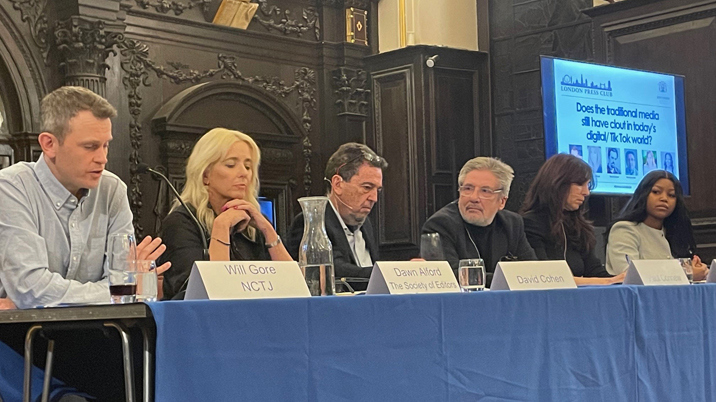
The audience consisted of paying members of the ancient livery hall and young journalists and media students invited free, and I was on the panel as a former national newspaper editor, media commentator and broadcaster who had written and broadcast on the Great Post Office Scandal, arguably the biggest miscarriage of justice in British legal history.
Until the day before the event, I’d planned an approach not dissimilar to the excellent, excoriating critique of certain MSM failures delivered by Liz Gerrard in her Notebook column for InPublishing. But then I received a couple of confidential steers from trusted broadcast contacts alerting me – sans details – to some explosive upcoming revelations, the results of diligent investigative journalism and destined to not only explode into the headlines onscreen and in print but also into the next phase of the official public inquiry.
Although unable to do more than drop a few hints to the debate audience, it did help re-frame my intended ‘Villains and Heroes’ opening statement, with the media emerging slightly more on the heroic side than originally drafted.
Further evidence of Post Office wrongdoing
Within days and a couple of weeks, those private steers proved spectacularly accurate. Hitherto secret damning tapes, documents, letters and e-trails were exposed across Channel 4 News, ITN, the BBC, Sky News, The Times, Guardian, Mirror, Independent et al. A veritable treasure trove of shocking new evidence that confirmed and reinforced the essential truth of ‘Mr Bates vs The Post Office’ and the 900 sub-postmaster and sub-postmistress victims.
Evidence that further exposed the privatised, government-owned Post Office as a long-running cesspit of managerial incompetence, dishonesty, corruption, cover-up and greed where ‘protecting the brand’ and protecting excessive executive and boardroom salaries and bonuses had trumped all sense of propriety and decency, even to the extent of almost certainly perverting the course of justice by knowingly misleading both the law courts and parliament and effectively casting innocent postmasters / mistresses as collateral damage, no matter that ‘brand protection’ meant the innocent being prosecuted, jailed and driven to bankruptcy, even suicide and social ostracism.
Evidence that the Post Office hierarchy clearly sacked Second Sight, the expert accountancy firm it had itself hired when it flagged up the fatal flaws in the now infamous Horizon computer, and ‘buried’ its reports and warnings.
Evidence that Post Office lawyers pressured one Fujitsu technician into changing a witness statement to strengthen the case against a postmaster, later proven innocent.
Evidence that Post Office bosses ran up legal bills well in excess of £100m of public funds in both prosecuting and trying to shut down the efforts by Mr Bates and hundreds of other innocent postmasters to clear their names and win proper compensation.
Hero campaigner
But even before the latest shameful revelations, the audience mood music at Stationers’ Hall had unsurprisingly struck a resoundingly sympathetic tone towards Alan Bates, the hero campaigner, and a sharply hostile one toward the Post Office and its leadership past and present. Mr Bates would certainly have enjoyed being there, while Paula Vennells, who had combined being an Anglican priest with being CEO of the Post Office during a crucial chunk of the miscarriage of justice scandal, would have heard the sentiment ‘prosecute her’ ringing in her ears.
Returning to the theme of the event, however, it was significant to discover, both during audience questions to the panel, and the following drinks reception, that many attendees hadn’t watched the ITV drama series ‘live’, but watched via catchup as broadcast and print headlines seized on it and social media contacts alerted them to it.
I was also struck by two key points even the young media attendees hadn’t really picked up from the TV drama series. Firstly, the archaic law empowering the Post Office to investigate and prosecute its own cases. (They weren’t alone. We’ve since had the beyond satire spectacle of former top Post Office figures pleading ignorance of the prosecution policy of the organisation they were supposedly running!)
Secondly, how a law change more than two decades ago (under the Blair government) effectively ruled computers were infallible unless proven otherwise. It was, I contended, an outrageous reversal of the fundamental principle of the British justice system… innocent until proven guilty. For the over mighty Post Office and its victims, that cruelly equated to long years of guilty unless proven innocent.
Even ITV execs acknowledge that, despite the brilliant cast and scripting, they hadn’t bargained on quite the scale of political / media / public opinion attention and outrage. Not that they’re complaining, with ‘Mr Bates vs The Post Office’ sold to the US and a string of other countries. Now ITV is planning a similar human drama about another, even longer-running miscarriage of justice, the tainted blood scandal report published to damning headlines in May.
After I posted on social media about the Stationers’ Hall event, I received a message from a senior Labour party politician, saying: “You should have made the point the bloody government are going to leave it to us to pick up most of the tab for the postmasters scandal, the blood scandal and the WASPI women’s pension crisis. As if we’re not going to inherit a toxic enough economic climate anyway.”
Subsequently, he’s also suggested the prime motive for Post Office Minister Kevin Hollinrake taking the unusual step (on the eve of Alan Bates’ public inquiry appearance) of telling the BBC that people responsible for the Horizon scandal “should go to jail” was that this is a general election year. Certainly surprising from a government minister in the middle of an ongoing statutory inquiry.
Inevitably, and not unreasonably, there was no shortage of questions during the Press Club / Stationers’ Hall debate and over drinks and canapes later, about why it had taken a TV drama to galvanise political and public opinion rather than traditional media journalism. More, of course, from Stationers’ Company members than the young media student guests, but not exclusively so.
This was where my ‘Heroes and Villains’ theme came into play, with me citing the fact that much of the source material for the ITV drama had come from traditional media, broadcast and print, as well as from Mr Bates’ crucial personal campaign testimony.
Take, for example, the BBC’s Nick Wallis with his three Panorama specials, his blogs, website, radio documentaries and a brilliant book, ‘The Great Post Office Scandal’ where he struggled to find a major publisher willing to take it on, given the Post Office’s litigious reputation. You can bet they’ll be queueing up to bid for a new edition.
Take Computer Weekly, the specialist publication whose young journalist Rebecca Thomson first broke the story in 2009 after a determined approach from Mr Bates. They’ve run over 300 significant stories since.
Take Private Eye, who took up the cause and consistently ran critical stories about the scandal, ignoring the Post Office’s litigious reputation, and even produced a Special Issue on the scandal.
Yes, in her scathing InPublishing column in January, Liz Gerrard was justified in accusing the UK national press of failing to take up the cause with sufficient strength. But I was somewhat less scathing at the debate, partly because I was aware of those major upcoming MSM revelations, and partly because, being involved in an international TV project on the scandal scheduled for next year, research shows rather more coverage over the years than some critics argue.
Low energy
For me, the relative failure of the national titles rests mainly in a dilution of traditional (old fashioned?) campaigning zeal, I told the audience. Over the years, you can trace back plenty of straight news stories when there has been a ‘newsworthy’ development in the battle for justice by the sub-postmasters. But not the kind of concerted, non-stop campaigning that my old ship, the Mirror, used to feature with its long abandoned ‘Shock Issue’ strategy.
The Daily Mail went OTT claiming some credit for a winning campaign. Yes, to its credit, it had featured a huge splash and spread on the scandal a few years ago and news stories of varying size since, but it hadn’t adopted anything remotely comparable to, say, its crusade against supermarket plastic shopping bags,
Just one example that’s emerged from research I’ve been involved in – back in 1999, when the Horizon system was being trialled in the Newcastle area, there were so many problems that sub-postmasters involved organised a protest meeting and complained to Post Office senior management. The local press gave it a good show, but, alas, national news outlets didn’t pick up on it. A trawl through local newspaper archives around the UK turns up hundreds of stories about the postmasters’ plight and fight, some big, some small, but very few that triggered national attention while lacking the editorial / financial muscle to mount meaningful campaigns against the Post Office behemoth.
It was this ‘dip in, dip out’ editorial approach, partly driven by newspaper industry cost cutting and partly by fear of expensive legal battles with deep-pocketed corporates, that characterised the press’ approach to the Post Office scandal; until, ironically, a TV dramatisation partly based on diligently researching past newspaper articles triggered the public outrage, the prior absence of which had enabled governments of varying stripes and politicians of both left and right, with a number of very honourable exceptions, to ignore those stories and turn deaf ears to Mr Bates and his fellow victims’ / campaigners’ pleas for justice.
When they come to make a sequel to ‘Mr Bates vs The Post Office’, as they surely will, recreating the powerful, poignant moment when one of those exceptional MP heroes, James, now Lord, Arbuthnot, wept when broadcasters played him those new incriminating tapes and showed him new damning documents will figure prominently.
And when they make that sequel, judging by his calmly charismatic, forensically sharp, wonderfully dry-witted and long awaited appearance at the public inquiry on April 9th, dare I suggest that Mr Bates is played by… Mr Bates.
It also struck me that Alan Bates could easily have had a star career in journalism with his penchant for headline-grabbing testimony such as branding the Post Office bosses ‘Thugs in Suits’ or suggesting the taxpayer-funded, government-owned organisation, once upon a time a respected national treasure, is now a busted flush that should be flogged off to Amazon for a quid.
Vennells’ testimony
Paula Vennells’ long-awaited 3-day appearance (23-26 May) under oath before the inquiry proved a sharp contrast to Aan Bates. Clearly between the orgy of strategic tears, unconvincing, self-serving apologies, blame-shifting and the same memory loss epidemic of “I can’t recall that meeting / email, conversation” et al that had already afflicted so many of her former colleagues, she invited the disbelief and derision she received from both the media and the furious postmasters and mistresses. At times, bizarrely talking about the Post Office as if she was somehow divorced from the entity where she was CEO.
This was the CBE-surrendering, disgraced business boss and ordained priest whose memory loss included some of the Ten Commandments. She struggled as KCs for the victims accused her of a “craven, self-serving cloud of denial” and revealed an email in which she said that media coverage of the Bates campaign had left her “bored rather than outraged”.
Shockingly, Vennells was exposed as having ditched a review into the Horizon system because her PR man warned it would make damaging “front page news”. If it had gone ahead, it would have spared postmasters ten years of prosecution, persecution and scandalous injustice.
On the last day of Vennells’ grilling, the government announced that legislation to clear hundreds of postmasters was being rushed through ahead of the snap general election. But Mr Bates and the outraged victims still want something more… the rare outcome of a British scandal public inquiry leading to bosses facing criminal prosecutions and potential imprisonment.
For once, you sense that this time, it might just be on the horizon (pun very much intended), because on 27th May, Scotland Yard announced that a dedicated 80 strong detective team is to investigate potential criminal offences arising from the Post Office scandal, although any charges wouldn’t be brought before 2026 after the public inquiry has concluded.
This article was first published in InPublishing magazine. If you would like to be added to the free mailing list to receive the magazine, please register here.












